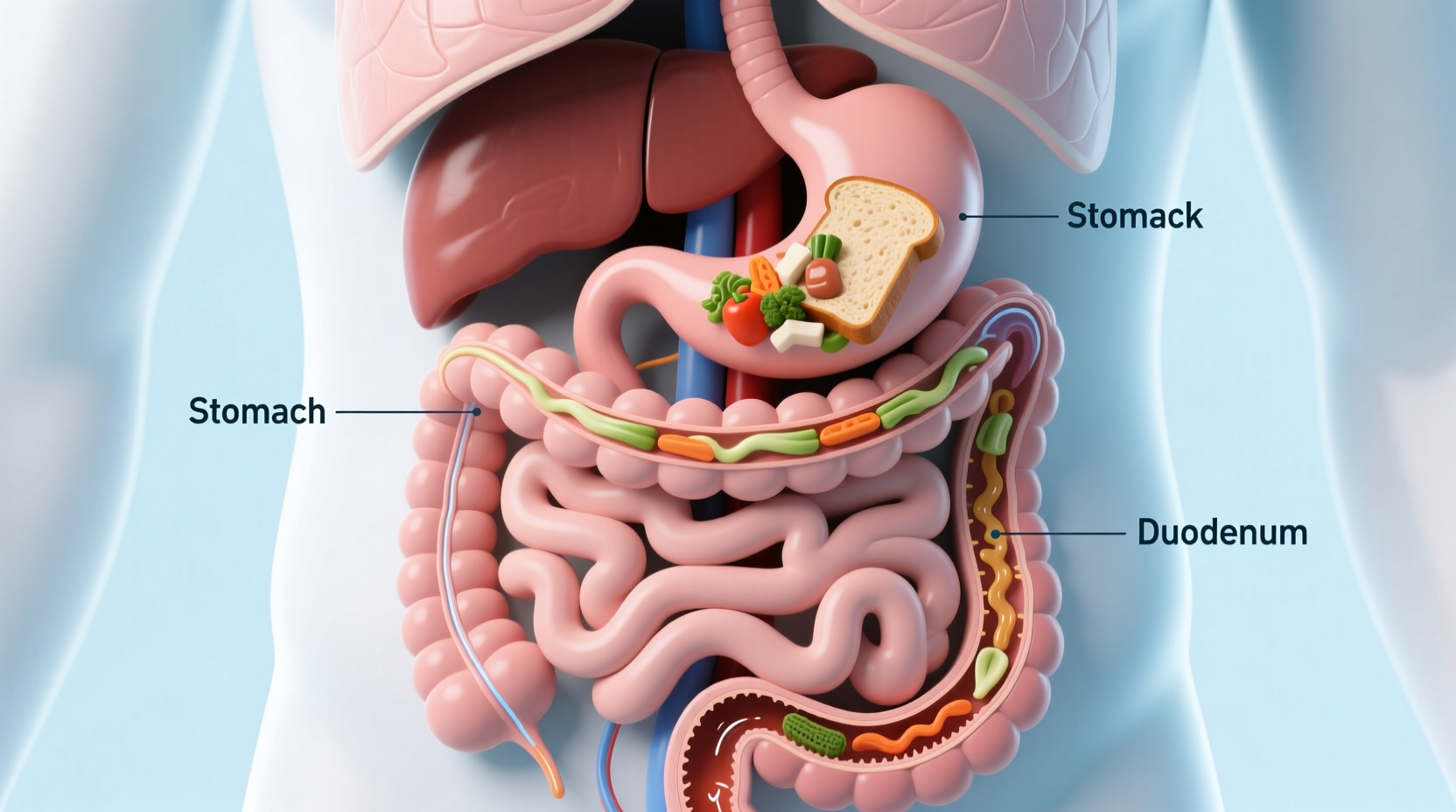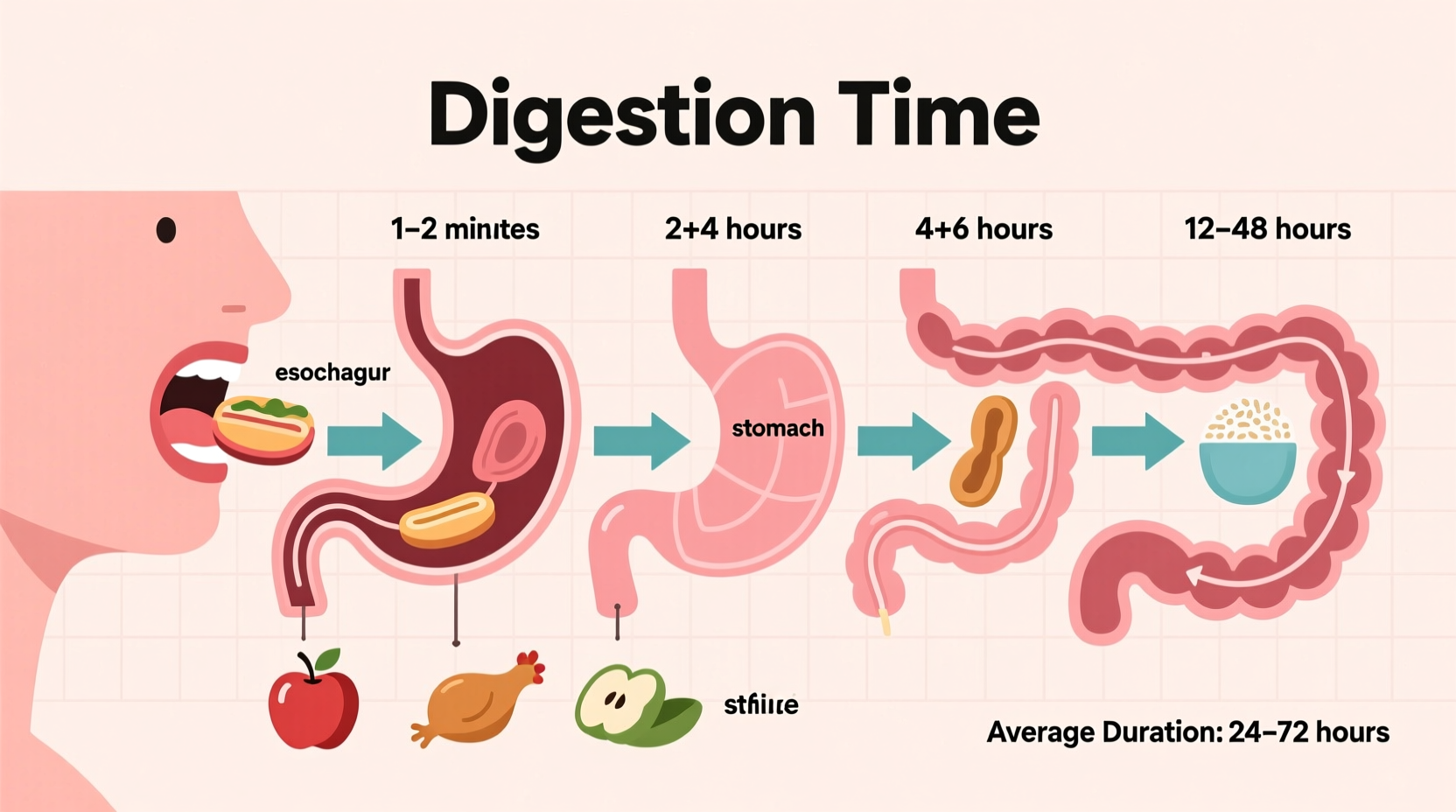The Digestive Timeline: What Happens After You Eat
Understanding how long food takes to digest requires examining the entire digestive process. While many people assume digestion happens primarily in the stomach, it's actually a multi-stage journey through your entire gastrointestinal tract. The complete process typically spans 24-72 hours from consumption to elimination, but different stages happen at different speeds.
| Digestive Stage | Time Range | Key Processes |
|---|---|---|
| Mouth | 30-60 seconds | Saliva breaks down carbohydrates; mechanical chewing begins digestion |
| Stomach | 2-5 hours | Acid and enzymes break down proteins; churning creates chyme |
| Small Intestine | 6+ hours | Nutrient absorption; bile and enzymes process fats and carbs |
| Large Intestine | 10-59 hours | Water absorption; bacterial fermentation; waste formation |
This timeline comes from research by the National Institute of Diabetes and Digestive and Kidney Diseases, which tracks gastrointestinal motility using specialized imaging techniques. Your specific digestion time depends heavily on what you eat and your individual physiology.
How Different Foods Digest: Protein vs. Carbs vs. Fats
Not all foods digest at the same rate. The macronutrient composition of your meal significantly impacts how long food takes to digest. Understanding these differences helps explain why some meals keep you full longer while others pass through quickly.
Proteins generally take the longest to digest, requiring thorough breakdown by stomach acid and enzymes before nutrients can be absorbed. Fats slow digestion further as they require bile for emulsification. Carbohydrates, especially simple sugars, move through the system more rapidly.
| Food Type | Stomach Emptying Time | Total Digestion Time |
|---|---|---|
| Water | 10-20 minutes | Nearly immediate absorption |
| Fruit (watermelon, oranges) | 20-30 minutes | 20-40 minutes |
| Vegetables (leafy greens) | 30-40 minutes | 40-60 minutes |
| Refined carbohydrates (white bread) | 1-2 hours | 2-3 hours |
| Proteins (chicken, fish) | 2-3 hours | 3-4 hours |
| Fats (avocado, nuts) | 3-4 hours | 4-6 hours |
| High-fiber meals (whole grains, legumes) | 4+ hours | 24-72 hours |
Research from Mayo Clinic confirms that high-fiber foods significantly extend digestion time but provide important health benefits through slower nutrient release and improved gut health. Fiber adds bulk to stool and feeds beneficial gut bacteria, which continue processing food in the large intestine for days after consumption.
Key Factors That Affect Your Digestion Time
Your personal digestion timeline isn't fixed—it changes based on several factors you can often control. Understanding these variables helps explain why the same meal might digest differently on separate occasions.
Meal Composition Matters Most
The combination of foods you eat dramatically impacts digestion speed. A salad with grilled chicken, avocado, and olive oil dressing will take significantly longer to digest than plain lettuce. Fats and proteins slow gastric emptying, while fiber-rich foods prolong the entire digestive process. This is why balanced meals keep you feeling full longer than simple carbohydrate meals.
Hydration and Physical Activity
Adequate water intake supports digestion by helping break down food and move waste through your system. According to the Centers for Disease Control and Prevention, proper hydration maintains mucosal lining in the intestines and prevents constipation. Physical activity also stimulates intestinal contractions—moderate exercise can speed digestion by 30% according to studies published in the Scandinavian Journal of Gastroenterology.
Individual Health Factors
Your age, metabolism, and health conditions significantly affect digestion time. As we age, digestive enzymes decrease, slowing the process. Conditions like irritable bowel syndrome (IBS), diabetes, and thyroid disorders alter normal motility. Women typically experience slower gastric emptying than men, particularly during certain menstrual cycle phases.
Recognizing Healthy Digestion vs. Problematic Patterns
Knowing what's normal helps identify potential digestive issues. While digestion time varies, certain patterns indicate healthy function versus possible concerns.
Normal digestion signs include regular bowel movements (once daily to three times weekly), minimal bloating after meals, and consistent energy levels. The Bristol Stool Chart classifies healthy stool as types 3-4—smooth, soft, and easy to pass.
Warning signs that warrant medical attention include:
- Consistently rapid digestion (less than 24 hours) with diarrhea
- Extremely slow digestion (more than 72 hours) with constipation
- Severe bloating or pain lasting more than 2 hours after eating
- Visible undigested food in stool regularly

Practical Tips for Optimizing Your Digestion
You can influence your digestion time through simple lifestyle adjustments. These evidence-based strategies support healthy gastrointestinal function without requiring drastic changes.
Strategic Food Pairing
Combine foods thoughtfully to optimize digestion speed. Pair proteins with non-starchy vegetables rather than heavy carbohydrates. Eat fruit separately from meals since it digests quickly and can ferment when held up behind slower-digesting foods. The Harvard T.H. Chan School of Public Health recommends filling half your plate with vegetables to support balanced digestion.
Chewing Thoroughly
Chewing 20-30 times per bite significantly reduces digestive workload. Proper mastication increases saliva production, which contains amylase enzymes that begin carbohydrate digestion. This simple habit can decrease stomach processing time by up to 20% according to research in the Journal of Neurogastroenterology and Motility.
Mindful Eating Practices
Eating slowly allows your brain to register fullness before overeating. The National Institute of Diabetes and Digestive and Kidney Diseases notes that it takes approximately 20 minutes for satiety signals to reach your brain. Rushed eating often leads to overconsumption, which substantially increases digestion time and discomfort.
Frequently Asked Questions About Digestion Time
How long does it take for food to leave your stomach?
Most foods leave your stomach within 2-5 hours. Liquids exit fastest (10-20 minutes for water), while high-protein and high-fat meals take longest (3-4 hours). Fiber-rich foods generally take 3-4 hours to empty from the stomach into the small intestine.
Why does meat take longer to digest than vegetables?
Meat contains complex proteins that require extensive breakdown by stomach acid and enzymes. Vegetables, especially non-starchy varieties, contain simpler carbohydrates and fiber that move through the stomach more quickly. Fats in meat further slow gastric emptying as the body processes them with bile in the small intestine.
Can you speed up digestion after a large meal?
Light physical activity like walking for 15-20 minutes can stimulate digestion by increasing blood flow to the digestive system. Avoid intense exercise which diverts blood away from digestion. Staying hydrated helps, but don't overdrink as this can dilute stomach acid. Never lie down immediately after eating as this slows gastric emptying.
How long does it take to digest specific foods like eggs or bananas?
Eggs take approximately 30-45 minutes to leave the stomach and 2-3 hours for complete digestion. Bananas take 30-60 minutes to exit the stomach, with fully ripe bananas digesting faster than green ones. The total digestion time for bananas ranges from 1-2 hours depending on ripeness and what other foods they're eaten with.
When should I be concerned about digestion time?
Consult a healthcare provider if you consistently experience digestion taking less than 24 hours with diarrhea, more than 72 hours with constipation, severe pain lasting over 2 hours after eating, or visible undigested food in stool. Sudden changes in your normal digestion pattern also warrant medical evaluation.











 浙公网安备
33010002000092号
浙公网安备
33010002000092号 浙B2-20120091-4
浙B2-20120091-4